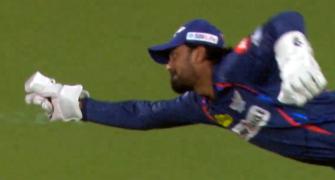Newcomers to Britain should not be taught English but cultural mixes such as 'Hinglish, Chinglish and Spanlish,' which should be part of the curriculum, a think tank suggested on Thursday.
The Demos think-tank considered 'Imperial' English to be out-dated and believed it should adapt to the global reach of the language. It said the English taught in schools should have a much more global flavour.
It said the government's call for newcomers to learn standard English are misplaced.
"Instead, they should be encouraged to learn blends like Hinglish (Hindi/Punjabi/Urdu-English), Chinglish (Chinese-English) and Spanglish (Spanish-English), which is widespread in America where it is also called Tex-Mex."
Earlier this week, Commons leader Jack Straw said Asian women should learn English before being allowed to settle in the UK. Without it, he said, they would find it impossible to integrate or work.
But the Demos report said the language is no longer the preserve of the English, who are 'just one of many share-holders in a global asset.'
"With non-native English speakers set to top two billion in as little as five years, Britain's influence, relationships and access to markets across the globe are at risk unless we change our outmoded attitude to language," it claimed.
Sam Jones, co-author of the report, said international influences need to be recognised as well as the growing use of hybrid English by immigrant groups.
"English can no longer be seen as a single language, but more as a family of languages," he said.
The report said there are more English-speakers in India than anywhere else, and satellite television, films and the internet mean that more people in the sub-continent are exposed to both standard English and Hinglish.
The think tank said the Oxford English Dictionary should be replaced as the leading authority on English by a website listing words suggested by the public. The site would let people across the globe contribute their own new words and definitions, creating a growing database in the same way as online encyclopaedia Wikipedia.
Indian words such as pyjamas, caravan, bungalow and thug were long ago imported into standard English.
The word dollally comes from the Indian town of Deolali, where there was an asylum during the Raj. The ubiquitous tag 'innit' is believed to have started among Indians in the West Midlands in the 1970s via 'haina' - a Hindi phrase, stuck on the sentences and meaning 'isn't it?'
Among other Hinglish words are: chuddies - underpants; desi - a south Asian; ganja - bald, machi chips - fish and chips, shaadi - a wedding, sharaabi - drunkard; stepney - a spare of anything, a mistress. The stepney was originally a type of spare tyre manufactured in Wales.
Some Hinglish phrases include Time kya hua hai? What is the time right now?, I have hazaar things on my mind right now - I have a thousand of things on my mind right now, and he is a postwalla - he works in a post office.
The report maintained that the British attitude to English 'is better suited to the days of the British Empire than the modern world.
"Far from being corruptions of English, new forms of the language such as 'Chinglish' have values that we must learn to accommodate and relate to," it stated.
The think tank proposed that immigrants, who are required to learn English if they want to be citizens, should be able to do so 'in ways which best allow them to contribute to English culture on their own terms.'
Demos also wanted a new web-based dictionary setting out the global 'family of English languages' to be updated as new forms arise.
The report, entitled 'As You Like It,' estimated that the economic advantage to Britain of speaking the world's most common language is worth 14.5 billion pounds a year.
However, Lee Knapp, the UK manager for Cambridge University's English for Speakers of Other Language examinations, was cool on the concept of language blends. "The fact is, people want standard English," he said.
"The more varieties, the greater the use of English for communication, the more government authorities want to establish a reliable standard for their populations, the more employers want solid guidance for recruitment -- and more than anything else, we know the learners want to be measured against a respected standard," he added.
But some language experts said the proposals would worsen matters.
The Queen's English Society said: "It is important there is a standard set of English we all understand, whatever children might use in the playground or new words appear on the Internet. Schools are already having difficulty teaching standard English because of a growing international influence, and they don't need to be further sidetracked."








